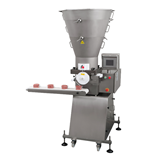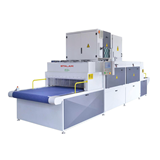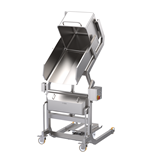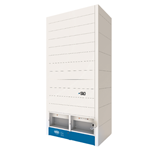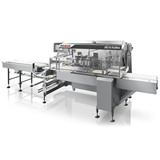The Role of Automated Checkweighers in Industrial Scale Food Production
As demand for food products grows, the need for better technology to ensure efficient production and quality control increases. In industrial weighing scales, automated check weighers are a significant advancement, providing a fast and accurate way to measure product weight directly on the production line. Manual weighing and slow processes are now a thing of the past. Today’s check weighers use advanced sensors and software to weigh products and improve production efficiency. This article explores why automated check weighers are vital to high-volume food production.
How Do Food Check Weighers Operate?
Food check weighers combine highly accurate hardware with advanced software to measure the weight of food products. These machines operate at high speed, processing each product in seconds while following a series of precise steps:
-
Product Feeding
The process starts with a conveyor belt transferring products to the check weigher near the production line. Products move seamlessly into the machine for inspection.
-
Weighing Mechanism
Check weighers rely on load cell sensors, which accurately detect the weight of a packaged item and convert it into an electrical signal for further analysis.
-
Comparison to Target Weight
The machine’s internal computer processes the electrical signal and shows the product’s weight on a screen. It then compares this weight to a predefined target range set by your business, allowing you to control acceptable weight thresholds to meet regulatory standards.
-
Sorting and Rejection
After the comparison, the checker determines whether the product is within the acceptable range. It uses visual signals, such as green, yellow, or red lights, to indicate whether the product passes or fails. Green means the product is within the target range; yellow indicates a slight deviation, and red signals a significant discrepancy.
You can program the check weigher to take action when a product falls outside the set range, such as redirecting underweight items for further inspection.
-
Data Collection and Analysis
Modern check weighers also store detailed data on product weights, allowing for trend analysis. This feature helps identify patterns and address ongoing weight inconsistencies, improving production efficiency.
What Are the Benefits of Checkweigher Solutions in the Food Industrial Weighing Scale?
A high-precision checkweigher is essential for keeping product weight consistent, especially for products with pre-printed packaging and labelling. It ensures that the product weight matches the stated weight and nutritional information, helping businesses follow industry standards and rules. Checkweighers also provide a cost-effective option to manual labour, saving time and effort in production.
These systems are designed for use with both packaged and unpackaged products. They feature automatic weighing compensation, zero tracking, and automated measurement adjustments, making them a reliable and efficient solution in high-volume food production.
How do Checkweighers Help High-Volume Food Manufacturing
-
Protects Brand Reputation
Checkweighers ensure that every product meets precise standards through accurate weighing. This provides consumers with quality assurance and safety. Checkweighers also help maintain consistency, which protects the brand’s reputation, encourages customer loyalty, and justifies product pricing for business stakeholders.
-
Enhances Resource Utilisation
High-precision checkweighers help optimise production by maintaining tighter tolerances. This efficiency leads to less waste and enables the production of more final products from minimal inventory, making checkweighers critical in maximising resource use in high-volume food production.
-
Reduces Product Rejections
Simplify processes and minimise product rejections by ensuring consistent quality. Fewer scrapped products and rework save costs and improve operational efficiency; checkweighers can help reduce errors and labour costs associated with manual quality checks.
-
Improves Work Performance
Checkweighers enhance overall work performance. These systems minimise overfills and underfills, leading to more efficient production and increased output, ultimately boosting the manufacturing facility’s productivity.
Conclusion
The rising demand for food products underscores the necessity for innovative technologies that enhance production efficiency and ensure quality control. Automated checkweighers are pivotal in high-volume food manufacturing, offering rapid and accurate weight measurements on the production line, thereby eliminating outdated manual methods.
Their effective operation—from product feeding to data analysis—streamlines processes, reduces waste and ensures compliance with regulatory standards. The benefits are significant: checkweighers protect brand reputation by maintaining product consistency and safety, enhance resource utilisation by optimising production, and minimise product rejections through rigors quality assurance.
Ultimately, these advanced systems improve operational efficiency and bolster the overall success of food production facilities. Adopting automated checkweighers is essential for manufacturers aiming to thrive in a competitive market, ensuring they meet consumer expectations while optimising their production processes.
Optimise Your Weighing Process!
Don’t settle for less when it comes to accuracy and efficiency. Request a quote for our automated checkweighers and see how we make it easy for you to connect with the best supplier in Australia. Get a checkweigher quote now!
FAQ:
-
What is an automated checkweigher?
An automated checkweigher is a machine that measures the weight of food products on the production line, ensuring they meet predefined weight specifications. It combines advanced sensors and software for rapid and accurate weight measurements.
-
How do checkweighers improve production efficiency?
Checkweighers streamline the weighing process by operating at high speeds, allowing products to be measured within seconds. This automation reduces manual labour, minimises errors, and increases output, ultimately enhancing overall productivity.
-
What types of products can checkweighers measure?
Checkweighers are designed for packaged and unpackaged products, making them versatile for various food items in high-volume production settings.

.jpeg)
-160x160-state_article-rel-cat.png)

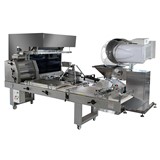


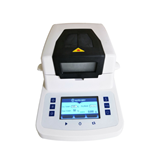

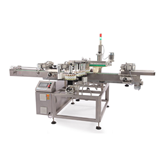



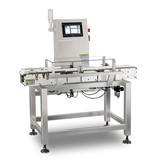



-160x160-state_article-rel-cat.png)

